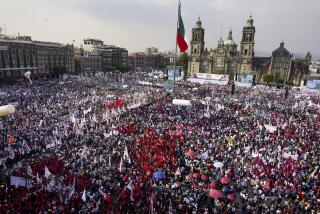U.S. to Extend $545 Million in Credit to Mexico : Short-Term Loan Part of $1.6-Billion Package From Several Nations, Banks
- Share via
WASHINGTON — The Reagan Administration announced Wednesday that it will extend $545 million in short-term credit to Mexico to help that country cope with its crippling debt obligations for the next few months.
The U.S. contribution, announced jointly by the Treasury Department and the Federal Reserve Board, is to be repaid within six months from the $3.6-billion long-term loan agreement worked out last month between Mexico, the World Bank and the International Monetary Fund.
The U.S. loan would be the largest single contribution to an overall $1.6-billion short-term line of credit to be extended by the leading industrial nations, four Latin American central banks and a consortium of international commercial banks to which Mexico is already deeply in debt.
Under the arrangement announced Wednesday, Mexico would be able to immediately draw on $850 million to shore up international reserves that have been shattered by this year’s collapse in the price of oil--Mexico’s main source of export earnings. The remainder of the $1.6-billion bridge loan would be available at a later, unspecified time.
Treasury sources said that any part of the U.S. contribution to the credit package that Mexico draws on would have to be repaid within six months at interest rates that they described as “confidential.” However, it is understood that the interest rate would be tied to current rates on six-month Treasury bills, now about 5.35%.
$97.6-Billion Foreign Debt
The World Bank-IMF bail-out package, announced July 22, included a statement in which the United States committed itself to participate in any short-term credit support arrangement that could be worked out among Mexico’s international creditors.
Specifically, the United States was to work with the Basel, Switzerland-based Bank for International Settlements to help coordinate the added participation of other countries and commercial banks that hold a large portion of Mexico’s massive $97.6-billion foreign debt.
Under the $1.6-billion credit package announced Wednesday, $1.1 billion would come from governments and central banks and the remaining $500 million from commercial banks.
Of the $1.1 billion, $555 million in credit extended by countries other than the United States is divided among Belgium, Canada, France, West Germany, Japan, Italy, the Netherlands, Sweden, Switzerland and Spain. Also contributing are the central banks of Argentina, Brazil, Colombia and Uruguay.
The $545-million U.S. contribution would require no budget obligation. About half of it is to come from a special Treasury fund, known as the Foreign Exchange Stabilization Fund, set up for use in foreign exchange transactions. The other half would be provided by the Fed through swap arrangements under which Mexico would put up pesos for the dollars it borrows, then pay back in dollars.
$3.6-Billion Loan Package
The short-term credit “is being made available in light of the agreement between the United Mexican States and the managements of the IMF and World Bank on a growth-oriented economic program,” the joint Fed-Treasury announcement said.
Accordingly, any borrowings from the new government short-term line of credit would be repaid from the eventual World Bank-IMF disbursements under the $3.6-billion loan package. If Mexico draws on the $500-million credit extended by commercial banks, the repayments would come from other disbursements under a longer-term financing arrangement still being negotiated between Mexico and the banks, the statement said.
Under the July 22 agreement, which Mexican Finance Minister Gustavo Petricioli signed after protracted and intense negotiations with World Bank and IMF managers--with active U.S. participation--Mexico agreed to reduce its massive budget deficit by 3% during 1987 and made a commitment to make basic structural reforms in its economy.
These steps included tax reform, an accelerated privatization of state-owned government industries that are run inefficiently and opening the centrally controlled Mexican economy to more foreign investment. Because the line of credit extended Wednesday is ultimately to be financed by funds made available in the July agreement, no further Mexican promises of economic reform were exacted.
More to Read
Sign up for Essential California
The most important California stories and recommendations in your inbox every morning.
You may occasionally receive promotional content from the Los Angeles Times.













